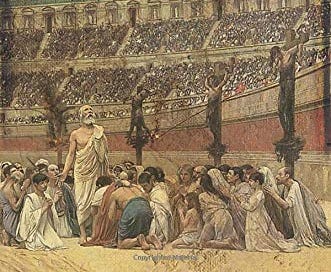If you are looking for the beginning of the study for Eusebius’ Church History then you can go HERE for a brief introduction. At the bottom of the introduction you will find the links to each section of the study guide as it becomes available. If you would like to see the growing list of book studies available for free on this site you can go HERE. Enjoy!
Virtues/Vices/Great Ideas: (Find them in the Text)
Freedom, Peace, Justice, Ignorance, Despotism, Wilderness vs. Civilization, Light vs. Darkness
Grammar Questions: (The Information of the Text)
According to the Edict of Milan, what had been “long intended” by Constantine and Licinius?
What reasons did Constantine and Licinius cite as to why they “decided to issue” these decrees?
According to the edict of Milan, why was it “appropriate to send a rescript” concerning “the earlier letter sent” during the reign of Galerius?
What did Constantine and Licinius command the governors to do concerning Christian “places of assembly?”
For what purpose did Constantine write to Miltiades, bishop of Rome?
For what purpose did Constantine write to Chrestus, bishop of Syracuse?
For what purpose did Constantine write to Caecilian, bishop of Carthage?
What did Constantine desire for those who were “clergymen” (ordained ministers in the church) not to do?
What did Licinius do which Eusebius described as “turning from the path of prudence?”
Who helped Constantine to defeat Licinius and by what means was this accomplished?
Logic Questions: (Interpreting, Comparing/Contrasting, Reasoning)
Why might it have been politically prudent for Constantine (in the Edict of Milan) to make clear that he was extending religious freedom not only to Christians but to all religions in the empire?
Why might Constantine have been eager to establish a synod to deal with the controversy surrounding Caecilian?
What principles of justice and fairness do we see Constantine insisting upon for the synod to be held concerning Caecilian?
Why would Constantine order that clergymen should be “kept entirely free from all public duties?”
The vice of ignorance may be defined as not knowing something which one ought to know and therefore acting imprudently. How might we lay Licinius proved to be ignorant?
Rhetoric Questions: (The Analysis of Ideas in the Text)
Is freedom of religion an unqualified good or are there appropriate limitations which should apply? What should Christians want concerning laws governing which religions can be practiced? Explain and defend your answer with good reason.
The concept of “reparation” refers to the restoring, repairing, making amends, or payment to someone (or some group) for wrongdoing that was done to them in the past. To what extent is reparation a legitimate part of justice? Do you think the concept of reparation can ever be abused? If so, what would be an example of abusing this principle of justice? If not, why is it so invulnerable to abuse? Do you think Constantine was right to demand the restoration of church properties back to the catholic church? Why or why not?
Some have argued that Christianity and the state (government) became inappropriately entwined when emperor Constantine became a Christian. What are some examples we see of interaction between the Roman government and the Christian church in this reading? Would you say there is a confusion between the appropriate roles of church and state in this reading? What kind of relationship should these two entities have if the world was operating in a biblically just way? Explain your answer carefully.
Theological Analysis: (Sola Scriptura)
Read Numbers 5:5-10 and Leviticus 6:1-7. How do these passages of Scripture relate to our current reading and what should we take from them as a matter of Christians practice?
Read Luke 19:1-10. How do we see Zacchaeus honoring the Scripture’s teaching on restoration to those whom we have wronged? How did he go even further in demonstrating his repentance and faith?



